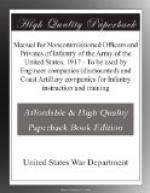228. In ease the remains of a deceased officer or soldier are carried past, the guard will turn out and present arms.
229. In time of war all guards will turn out under arms when armed parties, except troops at drill and reliefs or detachments of the guard, approach their post. (See par. 53.)
230. The commander of the guard will be notified of the presence in camp or garrison of all persons entitled to the compliment except general officers of the Army, the commanding officer, and the officer of the day. Members of the guard will salute all persons entitled to the compliment and all officers in the military or naval service of foreign powers, officers of the Army, Navy, and Marine Corps, officers of volunteers, and officers of militia when in uniform.
GENERAL RULES CONCERNING GUARD DUTY.
232. Eighty-fiftharticle_of_war_.— Any person subject to military law, except an officer, who is found drunk on duty shall be punished as a court-martial may direct.
233. All material instructions given to a member of the guard by an officer having authority will be promptly communicated to the commander of the guard by the officer giving them.
234. Should the guard be formed, soldiers will fall in ranks under arms. At roll call each man, as his name or number and relief are called, will answer “Here,” and come to an ORDER ARMS.
235. Whenever the guard or a relief is dismissed, each member not at once required for duty will place his rifle in the arm racks, if they be provided, and will not remove it therefrom unless he requires it in the performance of some duty.
236. Without permission from the commander of the guard, members of the main guard, except orderlies, will not leave the immediate vicinity of the guardhouse. Permission to leave will not be granted except in cases of necessity.
237. Members of the main guard, except orderlies, will not remove their accouterments or clothing without permission from the commander of the guard. (Par. 66.)
SECTION 15. PRISONERS.
238. Articles of war 69, 70, 71, 72, and 73 have special reference to the confinement of prisoners and should be carefully borne in mind.
239. The commander of the guard will place a civilian in confinement on an order from higher authority only, unless such civilian is arrested while in the act of committing some crime within the limits of the military jurisdiction, in which case the commanding officer will be immediately notified.
240. Except as provided in the sixty-eighth article of war, or when restraint is necessary, no soldier will be confined without the order of an officer, who shall previously inquire into his offense. (A. R. 930.)
241. An officer ordering a soldier into confinement will send, as soon as practicable, a written statement, signed by himself, to the commander of the guard, setting forth the name, company, and regiment of such soldier, and a brief statement of the alleged offense. It is a sufficient statement of the offense to give the number and article of war under which the soldier is charged.




